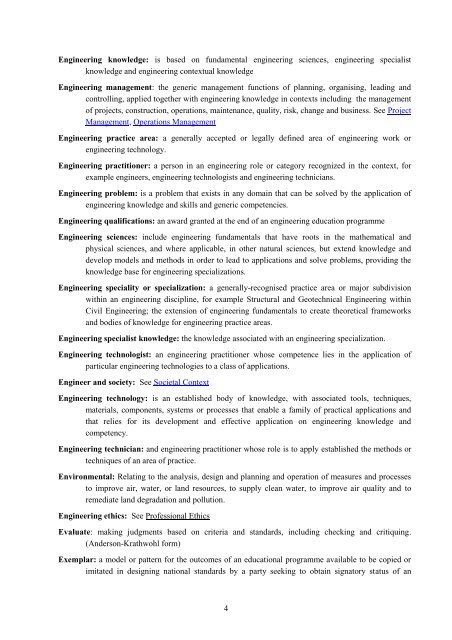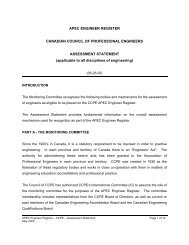Glossary of Terms (pdf) - Washington Accord
Glossary of Terms (pdf) - Washington Accord
Glossary of Terms (pdf) - Washington Accord
Create successful ePaper yourself
Turn your PDF publications into a flip-book with our unique Google optimized e-Paper software.
Engineering knowledge: is based on fundamental engineering sciences, engineering specialist<br />
knowledge and engineering contextual knowledge<br />
Engineering management: the generic management functions <strong>of</strong> planning, organising, leading and<br />
controlling, applied together with engineering knowledge in contexts including the management<br />
<strong>of</strong> projects, construction, operations, maintenance, quality, risk, change and business. See Project<br />
Management, Operations Management<br />
Engineering practice area: a generally accepted or legally defined area <strong>of</strong> engineering work or<br />
engineering technology.<br />
Engineering practitioner: a person in an engineering role or category recognized in the context, for<br />
example engineers, engineering technologists and engineering technicians.<br />
Engineering problem: is a problem that exists in any domain that can be solved by the application <strong>of</strong><br />
engineering knowledge and skills and generic competencies.<br />
Engineering qualifications: an award granted at the end <strong>of</strong> an engineering education programme<br />
Engineering sciences: include engineering fundamentals that have roots in the mathematical and<br />
physical sciences, and where applicable, in other natural sciences, but extend knowledge and<br />
develop models and methods in order to lead to applications and solve problems, providing the<br />
knowledge base for engineering specializations.<br />
Engineering speciality or specialization: a generally-recognised practice area or major subdivision<br />
within an engineering discipline, for example Structural and Geotechnical Engineering within<br />
Civil Engineering; the extension <strong>of</strong> engineering fundamentals to create theoretical frameworks<br />
and bodies <strong>of</strong> knowledge for engineering practice areas.<br />
Engineering specialist knowledge: the knowledge associated with an engineering specialization.<br />
Engineering technologist: an engineering practitioner whose competence lies in the application <strong>of</strong><br />
particular engineering technologies to a class <strong>of</strong> applications.<br />
Engineer and society: See Societal Context<br />
Engineering technology: is an established body <strong>of</strong> knowledge, with associated tools, techniques,<br />
materials, components, systems or processes that enable a family <strong>of</strong> practical applications and<br />
that relies for its development and effective application on engineering knowledge and<br />
competency.<br />
Engineering technician: and engineering practitioner whose role is to apply established the methods or<br />
techniques <strong>of</strong> an area <strong>of</strong> practice.<br />
Environmental: Relating to the analysis, design and planning and operation <strong>of</strong> measures and processes<br />
to improve air, water, or land resources, to supply clean water, to improve air quality and to<br />
remediate land degradation and pollution.<br />
Engineering ethics: See Pr<strong>of</strong>essional Ethics<br />
Evaluate: making judgments based on criteria and standards, including checking and critiquing.<br />
(Anderson-Krathwohl form)<br />
Exemplar: a model or pattern for the outcomes <strong>of</strong> an educational programme available to be copied or<br />
imitated in designing national standards by a party seeking to obtain signatory status <strong>of</strong> an<br />
4




